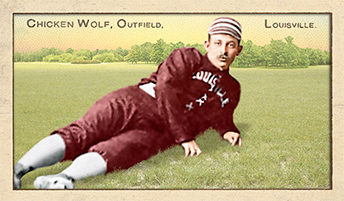
- Series: Beginnings: 1880's
- City: Louisville
- Team: Colonels
- League: American Association
William Van Winkle “Jimmy” Wolf (1862-1903) played virtually his entire career with Louisville, starting in 1882 when the club was known as the Eclipse and continuing with the Colonels through the 1891 season. He played three games for the Browns in ‘92 before heading, for the first time, to the minors for three campaigns. Known mostly as Jimmy, Wolf had the Chicken moniker hung on him by teammate Pete Browning after Wolf gorged on a pre-game boiled bird and committed several errors that day. By any name, Wolf earned a renown that has since eluded him. He was, arguably, the best hitter in the history of the American Association, and is the league's all-time leader in games played, hits, doubles, triples and total bases. The second-class status of the 19th century’s “junior circuit” has always weighed heavily in Cooperstown evaluations. Jimmy reached his pinnacle in 1890, hitting .363 and leading the post-season tourney with .360 and eight RBI. The right-hander was primarily an outfielder, but eventually saw action at every position. The previous year had immersed Wolf in the most controversy of his career. A feud with manager Dude Esterbrook led to Wolf replacing him. Jimmy faithfully carried out owner Mordecai Davidson’s tough fine schedule for on-field lapses. Things erupted into the first players’ strike and Davidson sold the club mid-summer with Wolf ending his managerial career.
- The trials and tribulations of the 1889 season swirled around Wolf and his hapless teammates en route to a spectacularly dismal record of 27-111. No surprise that tempers flared and fights broke out. Davidson’s obstinance, particularly his penchant for dunning his players, exacerbated the situation. It is to Wolf’s credit that he persevered while holding the captain’s reins and, despite the bad blood, his teammates embraced him once Davidson was gone
- Wolf was intrepid on the ball field and off. In retirement he served as a firefighter in his hometown of Louisville. His tragic death at age 41 resulted from a traumatic brain injury incurred a few years prior to 1903. Wolf was buried beside childhood friend and comrade in arms, Pete "The Louisville Slugger" Browning
- William Van Winkle Jimmy Chicken Wolf. I just had to write that again.
- Wolf enjoys five known poses in the Old Judge canon
- This card of Chicken Wolf represents the 300th and final card in the 1880s: Base Set
- It is truly gratifying to close this series on such a high and symbolic note . . . .
- with an elusive player of some magnitude whom I have been yearning and struggling to get into the series for four years now (this is my fourth attempt at Chicken Wolf as his images are scarce and typically of poor quality)
- who has a name so deep in the alphabet (only 5 OJ subjects follow Wolf alphabetically: Dandy Wood, Pete Wood, Harry Wright, Chief Zimmer & Frank Zinn - with Zinn being the only one to escape this series' reach)
- and with an OJ pose of such repose. Wolf's halfhearted enactment of a slide while resting on a tuft of carpeted grass strikes me more as somebody who is resting after a hard-fought and victorious campaign in the field of dreams . . . . and that is exactly how I feel in bringing this series to a close.
- The first release of this 300th & final card, on August 10, 2017, is the 2,068th card to be made and released from the 1880s: Base set
- I sold the first card from this series, Doc Bushong, on May 8, 2013, for $11.62 to a brave and courageous soul in Wind Gap, Pennsylvania
- I could not have gotten here from there without each and every one of you. Thank you, sincerely, for your tremendous support.
- The journey continues . . . . .
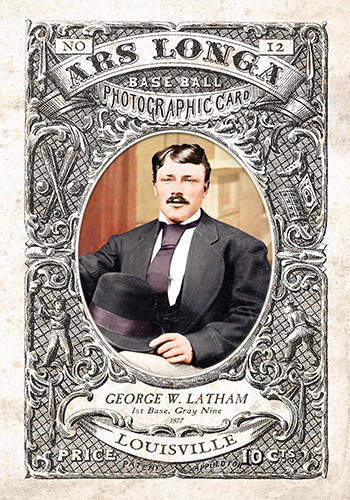
- Series: Mort's Reserve
- City: Louisville
- Team: Grays (NL)
- League: National League
George Warren Latham (1852-1914) came out of Utica, NY to become his hometown’s first player to make the major leagues. He began his career with a pretty good club, Harry Wright’s National Association champion Boston Red Stockings. They captured the pennant in 1875 with a 71-8 record. Juice (also known as Jumbo) got into only 16 of those games in ‘75, but he hit a solid .269 with 13 RBI. Latham also played for the New Haven Elm Citys that year, but hit only .197 as a utility infielder. Perhaps his stint with Wright gave him baseball smarts that quickly paid off as Jumbo also managed the Elm Citys for 18 of their games despite his rookie status. Latham fared much better with his next big league team, the Louisville Grays in the National League’s second season, 1877. He hit a fine .291 as a regular first baseman and had the most plate appearances on the club. A four year hiatus ensued before Juice revived his big league career in the American Association. He played for the Philadelphia Athletics in ‘82 and again had a solid season, batting .285, and was the team’s RBI leader with 38. The veteran moved back to Louisville with the AA’s Eclipse in 1883 and saw a drop-off in his stats, hitting .250 as the everyday first sacker. The following year would close-out his tenure in the majors, again with the Eclipse, where Juice slumped to .169 in his final summer at the top of his profession.
- Latham was far from through with baseball when he left Louisville. He enjoyed a minor league career that continued through the decade of the 1880s. He had played for Utica in the International League back in 1878 and would play for his hometown in 1886 and ‘87, as well as other Eastern League and International League teams
- Juice had shown further managerial skills with the London Tecumsehs of the International Association of Professional Base Ball Players back in 1877-78, a would-be rival to the new NL in the States. The Tecumsehs have been called the finest team in all of Canada in the early decades of the game
- Per the New York Times, Latham made a final appearance with the Richfield Springs, NY squad in 1894, just a short drive from Cooperstown - perhaps the closest Jumbo got to the Hall
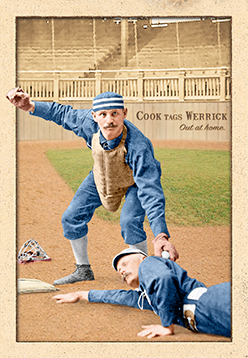
- Series: 1880s: Diamond Duos
- City: Louisville
- Team: Colonels
- League: American Association
Paul Cook:
Paul Cook (1863-1905) got into three games at catcher for Harry Wright’s struggling Philadelphia Quakers at the end of the 1884 season. He returned to the minors before getting picked up by the Louisville Colonels where he stayed four years before jumping to Ward’s Wonders for the Players’ League season of 1890. Cook finished up the following year with three teams, back in Kentucky, then the Lincoln Rustlers and, finally, the St. Louis Browns. During his five years with the Colonels, Cook batted a mere .219 with no power.
- In his early days, Cook played for Muskegon in the Northwestern League, the Toledo Avengers of the Western League, and the Washington Nationals of the Eastern League
- Paul played in D.C. for manager Mike Scanlon who would lead the club in ‘86 as they joined the National League
Joe Werrick:
Joseph Abraham Werrick (1861-1943) broke into minor-league ball in 1884 with the Winona Clippers of the Northwestern League, moving to their St Paul franchise later that summer. Joe became a major-leaguer almost by accident as the Apostles of the Twin Cities became a late entry into the Union Association that September as the White Caps. Hitting less than a buck in nine games sent Werrick to the Nashville Americans of the Southern League in ‘85. The Louisville Colonels took him on in ‘86 and Joe rewarded them the following year with a terrific output: .285 BA, 99 RBI and 49 steals. Unfortunately, his average plummeted to .215 in ‘88 and Werrick sought the shelter of the minors for the remainder of his lengthy tenure. He played for various teams in the Virginia and Interstate Leagues, finishing up with the Mansfield Haymakers in 1899 showing he still had power with 11 HRs and a .297 average.
- In his short-lived debut, Joe participated in a unique “record.” St Paul was a last-minute fill-in for the moribund Union Assoc and played only nine road games--a “major league” team that never played a home game
Auction History
Cartophilia
Old Judge Pose: 92-1
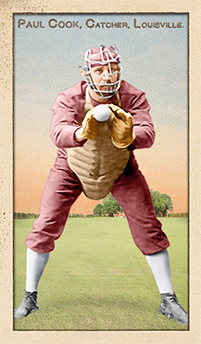
- Series: Beginnings: 1880's
- City: Louisville
- Team: Colonels
- League: American Association
Paul Cook (1863-1905) got into three games at catcher for Harry Wright’s struggling Philadelphia Quakers at the end of the 1884 season. He returned to the minors before getting picked up by the Louisville Colonels where he stayed four years before jumping to Ward’s Wonders for the Players’ League season of 1890. Cook finished up the following year with three teams, back in Kentucky, then the Lincoln Rustlers and, finally, the St. Louis Browns. During his five years with the Colonels, Cook batted a mere .219 with no power.
- In his early days, Cook played for Muskegon in the Northwestern League, the Toledo Avengers of the Western League, and the Washington Nationals of the Eastern League
- Paul played in D.C. for manager Mike Scanlon who would lead the club in ‘86 as they joined the National League
- Cook's uniform color on this card was changed in January, 2017 from blue to maroon to reflect recent reliable research by Craig Brown & friends at Threads of Our Game. One card had been previously released featuring a blue uniform.
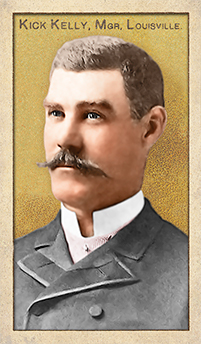
- Series: Beginnings: 1880's
- City: Louisville
- Team: Colonels
- League: American Association
John O. Kelly (1856-1926) was known variously as Kick, Honest John and Diamond John. He was a catcher for the Syracuse Stars and Troy Trojans in 1879 before turning to his real calling of refereeing, first in baseball and later in the boxing ring. As an operator of gambling houses in his native New York City, John “officiated” at another kind of gaming later in life.
Kick’s record at bat was a perfect motive to change uniforms. He averaged .155 in his 16 games in the early major leagues. By 1882 Kelly was umpiring in the National League and moved to the American Association the following season. Men in blue fared poorly in the diamond’s dawn. They were vilified and, too often, pelted by players and fans alike. Working alone gave ample opportunity for wily runners to cheat. Kelly lasted longer than most of his era. He and another “Honest John” (Gaffney) presided over the 1887 post-season match between the NL’s Wolverines and AA’s Browns. They pioneered a two-ump system that would transform the game.
- Kelly turned briefly to managing with the Louisville Colonels in 1887 and had a successful 76-60 season. His club flagged the following year and Kick was canned
- Refereeing Jim Corbett’s match in 1894 nearly cost Kelly his life. Baseball wasn’t the only hazardous profession for officials. Well-armed fans intimidated Kelly into a no-call




